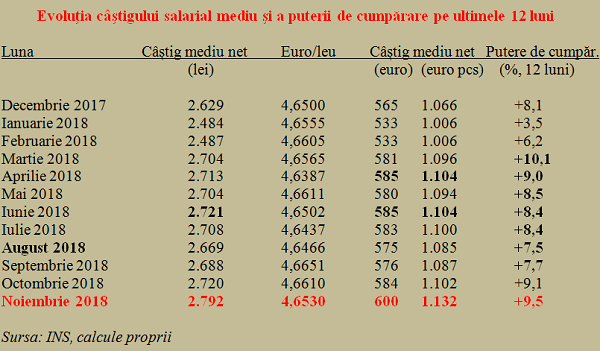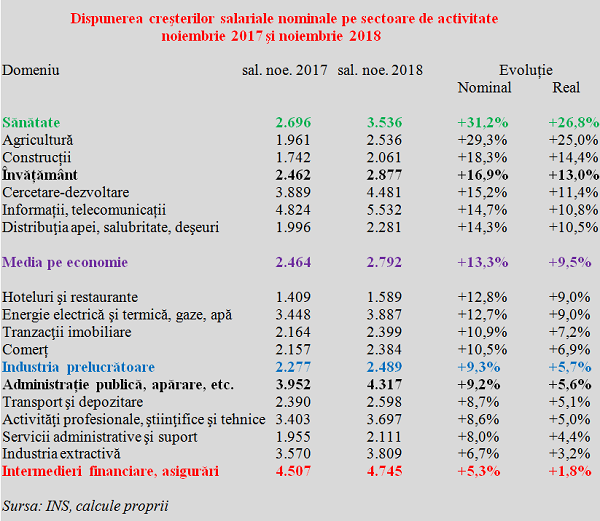 National gross average salary income for November 2018 was RON 4,658, 2.8% more than in the previous month, according to INS data.
National gross average salary income for November 2018 was RON 4,658, 2.8% more than in the previous month, according to INS data.
National nominal net average income increased by 2.6% to 2,792 lei, reaching the RON 600 threshold for the first time, at December’s average exchange rate, when the money has been earned and spent.
Adjusted to the price level (53% of the EU average, according to the latest Eurostat data), the purchasing power in euro rose to EUR 1,123. That is, EUR 600 earned in the country had the same effect, according to the official statistical methodology, with EUR 1,123 earned in a European country that would have prices at the average level (Italy is the closest to this situation).
Basically, after the average salary recovered from the decrease in July to September interval, it resumed its growth and will approach (probably successfully) the level of RON 2,800 at the end of the year.
The real earning index compared to the previous month was 102.7%, and on the back of the moderation of inflation, the increase compared to the same month of the previous year was at + 9.5%, the second highest increase in the last 12 months after March 2018.
The real reference wage (the purchasing power of the money earned expressed as an index compared to the purchasing power from October 1990, the last before the price liberalization) rose significantly by 5.3 percentage points, to 198.7%. The psychological level of 200% has this way become approachable for the end of 2018.
*
- Evolution of the national average net wage and purchasing power over the last 12 months
- Month Average net wage Euro/RON Average net wage Purchasing power
- December 2017
- January 2018
- February 2018
- March 2018
- April 2018
- May 2018
- June 2018
- July 2018
- August 2018
- September 2018
- October 2018
- November 2018
*
Increases by sectors – healthcare first, extractive industry within the negative range in terms of purchasing power
By sector of activity, the highest increase in wages was recorded in healthcare (+ 31.2% nominal and + 26.8% in real terms). Right behind, it appeared the agricultural sector (+ 29.3% nominal and + 25.0%, real terms) and the explanation is the strong increase in the forestry, logging operations, fishery and aquaculture segment (+ 61.3% nominal and +55.9% in terms of purchasing power), where the net average wage reached RON 3,784.
Far behind are constructions (18.3% nominal and 14.4% in real terms), education (+ 16.9% nominal and + 13.0% real terms), research and development activities (15.2% nominal 11.4% real terms), information and communications (14.7% nominal and 10.8% real) and water distribution, sanitation and waste (14.3%, respectively 10.5%), all of them above the average national wage growth.
Very close to this average level was the segment of hotels and restaurants and the electricity and heat generation, gas and water sector (both with a purchasing power increase of about 9% in real terms).
Public administration remained below the national average, with an advance of 9.2%, resulting in a 5.6% increase in purchasing power.
*
- Structure of nominal wage increases by sectors – November 2017- November 2018
- Sector Salary November 2017 Salary November 2018 Change
- Nominal Real
- Health
- Agriculture
- Construction
- Education
- Research and development
- IT&C
- Water supply, sanitation, waste
- National average
- Hotels and restaurants
- Electricity and heat generation, gas and water
- Real estate
- Trade
- Manufacturing industry
- Public administration, defence, etc.
- Transport and storage
- Professional, technical and scientific activities
- Administrative and support services
- Extractive industry
- Financial intermediations and insurance
*
The manufacturing sector, which sets the trend for the whole economy, recorded wage increases slightly higher than the public administration but remained in terms of the absolute level below 90% of the national average, a proportion significantly under the European practice.
The lowest wage increase was recorded in the financial intermediation and insurance sector (5.3% nominal and + 1.8% in terms of purchasing power).











